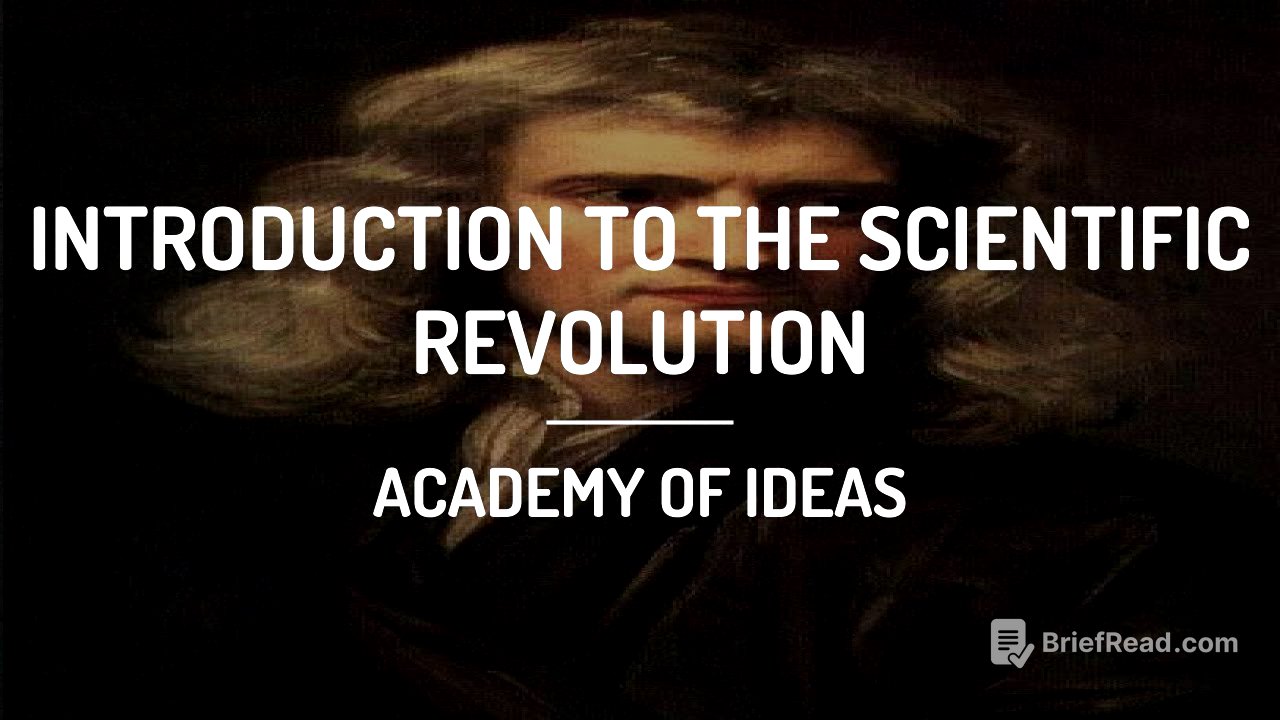TLDR;
This lecture provides an overview of the Scientific Revolution of the 16th and 17th centuries, emphasizing its transformative impact on science and human civilization. It highlights the shift from Aristotelian natural philosophy to a more mathematical and mechanistic understanding of nature. The lecture also touches on the influence of the Renaissance, the key figures of the era, and the emergence of the belief in progress as a result of scientific advancements.
- The Scientific Revolution (1500-1700) saw remarkable advances in science, influenced by the Renaissance and a rediscovery of ancient texts.
- It marked a shift from Aristotelian natural philosophy to a focus on mathematics and quantity in describing nature.
- Key figures like Copernicus, Kepler, Galileo, and Newton challenged and overturned Aristotelian views of the cosmos.
- The rise of the mechanical philosophy explained natural phenomena through mechanics and mathematical principles.
- The Scientific Revolution led to the belief in unending social and cultural progress through scientific advances.
Introduction to the Scientific Revolution [0:00]
The Scientific Revolution of the 16th and 17th centuries was a formative period in human civilization, though often misunderstood. The lecture will cover the general characteristics of this revolution, focusing on the shift away from the Aristotelian view of nature and the increased use of mathematics. The term "science" didn't gain its modern meaning until the 19th century; before that, "natural philosophy" was used to describe investigations into the natural world, encompassing fields like chemistry, physics, and biology. Mathematics and medicine were initially seen as separate from natural philosophy until the Scientific Revolution integrated mathematics as an essential tool for understanding nature.
The Renaissance Influence and Key Achievements [2:04]
The Scientific Revolution occurred in Europe from 1500 to 1700, marked by significant scientific advancements. Nicolaus Copernicus's heliocentric theory, introduced in 1543, is often seen as a starting point. The Renaissance, with its cultural and scholarly developments, played a crucial role, including the invention of the printing press, exploration of the New World, and the rise of Renaissance humanism. Humanist scholars rediscovered and translated ancient philosophical and mathematical works, influencing the philosophers of the Scientific Revolution. The 17th century saw major achievements by figures like Galileo Galilei, Johannes Kepler, René Descartes, and Isaac Newton, along with the widespread abandonment of Aristotelian natural philosophy.
The Decline of Aristotelian Natural Philosophy [3:57]
Aristotle's system had a significant impact on the natural philosophy of the Middle Ages. After the fall of the Western Roman Empire, Aristotle's works were reintroduced to Europe in the 12th century through translations from Arabic and Byzantine sources. Aristotle became the most influential ancient philosopher, with theologians like Saint Albertus Magnus and Saint Thomas Aquinas integrating Aristotelian philosophy with Christian theology to develop scholasticism. This system dominated European universities until the 17th century, influencing figures like Descartes and Galileo. The Aristotelian system was comprehensive but faced challenges during the Scientific Revolution, particularly his view of the cosmos.
Challenges to Aristotle's Cosmology [5:40]
Aristotle's geocentric view of the cosmos was challenged by astronomers like Copernicus, Kepler, Galileo, and Newton. Their work led to the abandonment of the earth-centered universe in favor of a heliocentric one. Aristotle's geostatic view, which held that the Earth remains stationary, was replaced by geokineticism, the understanding that the Earth exhibits both diurnal motion on its axis and annual motion around the Sun. Copernicus proposed the heliocentric and geokinetic hypotheses, but it was the work of Galileo and Newton that led to their widespread acceptance. Aristotle's division of the cosmos into the terrestrial and celestial realms was also largely relinquished.
Shift from Qualities to Quantities [7:41]
The Scientific Revolution saw a decline in the emphasis on qualities, a key feature of Aristotelian natural philosophy, and an increased focus on quantity. While qualities describe attributes like color, texture, or shape, quantities involve measurable aspects like weight, height, or number. Natural philosophers increasingly used quantity to describe nature, which went hand-in-hand with the growing role of mathematics. Mathematics, once seen as outside natural philosophy, became integral, with figures like Copernicus, Kepler, Galileo, and Newton using it extensively in their work. Galileo famously stated that the universe is written in the language of mathematics, using triangles, circles, and other geometrical figures.
The Rise of Mechanical Philosophy [9:12]
The mechanical philosophy supplanted the Aristotelian worldview, emphasizing quantity over quality. John Henry explains that all phenomena were to be explained in terms of concepts employed in mechanics: shape, size, quantity, and motion. The mechanical philosophy viewed the natural world as analogous to machinery, with change explained through the interactions of bodies like cogwheels in a clock. The move away from Aristotelian natural philosophy, the increased use of mathematics, and the rise of the mechanical philosophy were significant for the future development of science.
Impact and Legacy of the Scientific Revolution [10:09]
The 20th-century historian Herbert Butterfield considered the Scientific Revolution one of the most significant intellectual events of the modern period, alongside the emergence of modern historical consciousness. Butterfield suggested that the Scientific Revolution led to the belief in progress, a defining characteristic of modern humans' view of the future. Before the 18th century, the quality of life remained largely the same across generations. However, the practical applications of theoretical advances from the Scientific Revolution, in the form of new technologies, led to dramatic increases in living standards. This fostered the idea that continued scientific advances would lead to unending social and cultural progress, a belief widely accepted today.
Conclusion [11:37]
In conclusion, the Scientific Revolution was not the birth of science but a period of remarkable individual achievements in natural philosophy. It saw the overthrow of Aristotle's natural philosophy and an increased use of mathematics to describe the natural world. These changes have had a remarkable impact on the development of science to the present day, leading many to view the Scientific Revolution as one of the most formative periods in human civilization.









